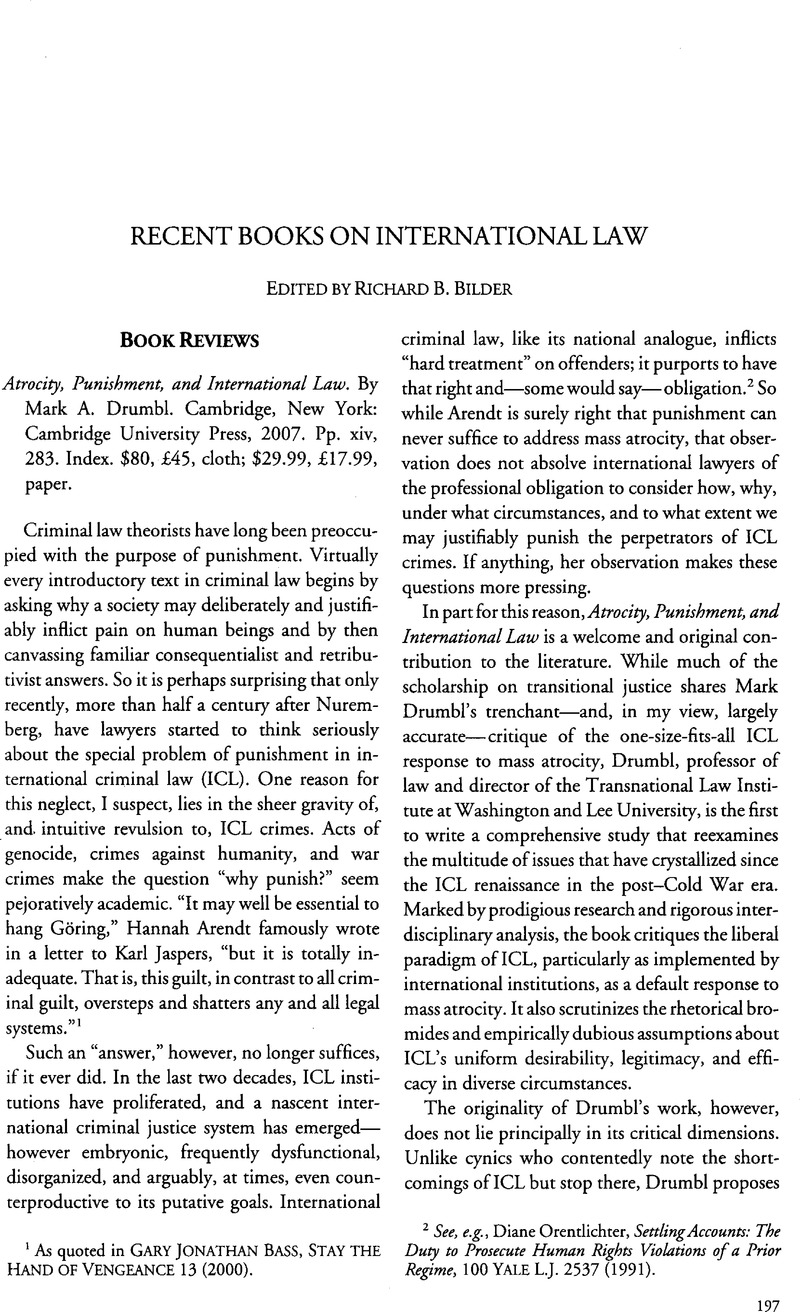Article contents
Atrocity, Punishment, and International Law. By Mark A. Drumbl. Cambridge, New York: Cambridge University Press, 2007. Pp. xiv, 283. Index. $80, £45, cloth; $29.99, £17.99, paper.
Published online by Cambridge University Press: 27 February 2017
Abstract

- Type
- Recent Books on International Law
- Information
- Copyright
- Copyright © American Society of International Law 2008
References
1 As quoted in Gary, Jonathan Bass, Stay the Hand of Vengeance 13 (2000)Google Scholar.
2 See, e.g., Diane, Orentlichter, Settling Accounts: The Duty to Prosecute Human Rights Violations of a Prior Regime , 100 Yale L.J. 2537 (1991)Google Scholar.
3 See Robert, D. Sloane, The Expressive Capacity of International Punishment: The Limits of the National Law Analogy and the Potential of International Criminal Law , 43 Stan. J. Int'l L. 39 (2007)Google Scholar. Expressivism, strictly speaking, is a function or feature rather than a rationale or purpose of punishment, though it facilitates and informs other penal goals. See, e.g., Joel, Feinberg, The Expressive Function of Punishment , in Doing and Deserving 95 (1970)Google Scholar; Dan, M. Kahan, What Do Alternative Sanctions Mean? 63 U. Chi. L. Rev. 591, 594-605 (1996)Google Scholar.
4 E.g., Hannah, Arendt, Eichmann in Jerusalem: A Report on the Banality of Evil 291-921 (Penguin Books rev. & enl. ed., 1994) (1963)Google Scholar; Immi, Tallgren, The Sensibility and Sense of International Criminal Law , 13 Eur. J. Int'l L. 561. 573 (2002)Google Scholar; Reisman, W. Michael, Legal Responses to Genocide and Other Massive Violations of Human Rights , 59 Law & Contemp. Probs. 75, 77 (1996)CrossRefGoogle Scholar; see generally Laurel, E. Fletcher & Harvey, M. Weinstein, Violence and Social Repair: Rethinking the Contribution of Justice to Reconciliation , 24 Hum. Rts. Q. 573, 606-17 (2002)Google Scholar.
5 See Report of the Secretary-General, The Rule of Law and Transitional Justice in Conflict and Post-conflict Societies, para. 42, UN Doc. S/2004/616* (Aug. 23, 2004) (noting that the “two ad hoc tribunals have grown into large institutions, with more than 2,000 posts between them and a combined annual budget exceeding a quarter of a billion dollars—equivalent to more than 15 percent of the [United Nations'] total regular budget,” and that “[a]lthough trying complex legal cases of this nature would be expensive for any legal system and the tribunals' impact and performance cannot be measured in financial numbers alone, the stark differential between cost and number of cases processed does raise important questions”).
6 See, e.g., Paul van, Zyl, Justice Without Punishment: Guaranteeing Human Rights in Transitional Socieities , in Looking Back, Reaching Forward: Reflections on the Truth and Reconciliation Commission of South Africa 42 (Charles, Villa-Vicencio & Wilhelm, Verwoerd eds., 2000)Google Scholar; Martha, Minow, Between Vengeance & Forgiveness (1998)Google Scholar. Indeed, the pluralization of international criminal justice stricto sensu, as well as of transitional justice, seems not only desirable, but inevitable. Among other reasons, as a practical matter international tribunals “will never be able to try more than a handful of the most egregious cases stemming from any particular conflict.” Laura, Dickinson, The Promise of Hybrid Courts , 97 AJIL 295, 303 (2003)Google Scholar.
7 José, E. Alvarez, Trying Hussein: Between Hubris and Hegemony , 2J. Int'l Crim. Just. 319, 321-22 (2004)Google Scholar.
8 Hart, H. L. A., Punishment and Responsibility 4 (1968)Google Scholar.
9 Jeremy, Waldron, The Right to Private Property 331 (1988)Google Scholar.
10 Theodor, Meron, The Humanization of International Law (2006)Google Scholar.
11 See Sloane, supra note 3, at 81.
12 Reisman, supra note 4, at 79.
13 UN Charter Art. 2(7).
14 Perhaps it remains appropriate to punish even in the absence of genuine moral choice, at least from the perspective of a crude form of utilitarianism, which conceives of deterrence solely in terms of influencing the supposed cost-benefit analyses of génocidaires and war criminals. But Drumbl's skepticism about ICL's efficacy in this regard strikes me as in most instances unassailable, even were we to embrace such an impoverished view of the manifold purposes and limits of punishment. See Herbert, L. Packer, The Limits of the Criminal Sanction (1968)Google Scholar.
15 Sloane, supra note 3, at 62.
16 George, Fletcher, The Storrs Lectures: Liberals and Romantics at War: The Problem of Collective Guilt , 111 Yale L.J. 1499, 1538-39 (2002)Google Scholar, appears to espouse this view.
17 See generally Fletcher & Weinstein, supra note
18 See David, Luban, Calling Genocide by Its Rightful Name: Lemkin ‘s Word, Darfur, and the UN Report , 7 Chi. J. Int'l L. 303 (2006)Google Scholar.
- 3
- Cited by




